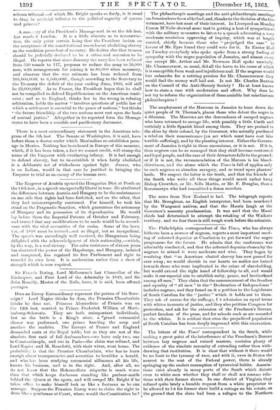The Philadelphia correspondent of the Times, who has always hitherto
been a scorner of negroes, reports a most important meet- ing of coloured deputies at Charleston to put forward the negro programme for the future. He admits that the conference was admirably conducted, and that the coloured deputies chosen by the negroes to attend it were moderate and wise. They began by resolving that "as American chattel slavery has now passed for ever away, we would cherish in our hearts no malice nor hatred towards those who were implicated in the crime of slaveholding, but would extend the right hand of fellowship to all, and would make it our especial aim to establish unity, peace, and brotherhood among all men." They claim that the announcement of the freedom and equality of "all men" in the" Declaration of Independence" includes negroes, and they found on it a petition to the Legislature of South Carolina for the " justice " which it holds out to them. They ask of course for the suffrage, f r admission on equal terms with whites to courts of justice, and they also petition Congress for protection, and ask for the extension of the Freedmen's Bureau, perfect freedom of the press, and for schools such as are accorded to the whites. It is evident that even the prejudiced population of South Carolina has been deeply impressed with this convention.


































 Previous page
Previous page